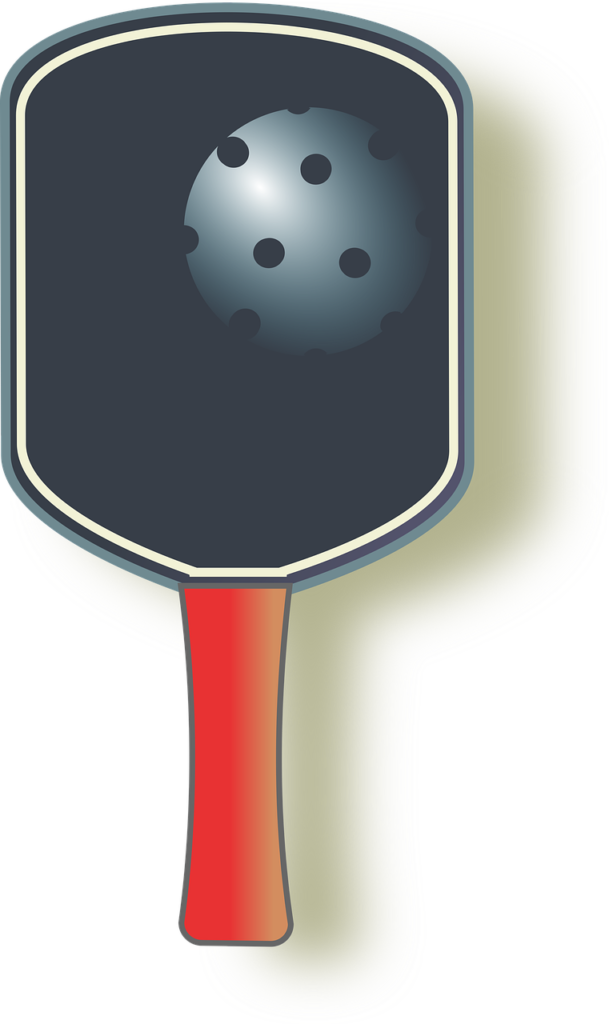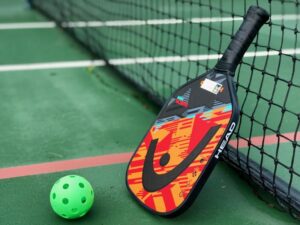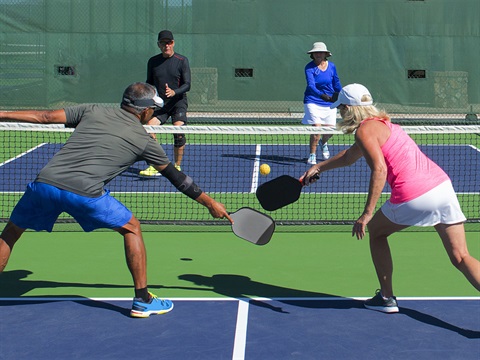Imagine a sport that blends the best elements of tennis, badminton, and table tennis into one exciting game. Enter pickleball, a rapidly growing sport that is capturing the hearts of people of all ages. Whether you’re a seasoned athlete or just looking for a fun way to stay active, pickleball offers a unique and accessible experience for everyone. In this article, we’ll explore the origins of pickleball, the rules of the game, and the reasons why it has become such a beloved pastime for individuals from all walks of life. Get ready to discover the joy of pickleball for yourself.

The Basics of Pickleball
What is pickleball?
Pickleball is a unique paddle sport that combines elements of tennis, badminton, and ping pong. It is played with a solid paddle and a perforated plastic ball, similar to a wiffle ball. The game is typically played on a court similar to that of tennis, with a low, central net dividing the playing area. Pickleball is known for its fast pace, strategy, and inclusivity, making it a popular choice for people of all ages and abilities.
History of pickleball
Pickleball was invented in the mid-1960s by Joel Pritchard, a congressman from Washington State, along with his friends Barney McCallum and Bill Bell. The game was originally created as a way to entertain their families during a summer afternoon. They improvised using badminton paddles, a wiffle ball, and a makeshift net in their backyard. The game quickly gained popularity amongst their friends and neighbors, and the rules were formalized over time. The name “pickleball” supposedly came from the Pritchard’s family dog, Pickles, who would often run off with the ball.
Equipment needed for pickleball
To play pickleball, you will need a few essential pieces of equipment. The most important item is a pickleball paddle, which can be made of wood, composite materials, or graphite. The paddle should be lightweight and comfortable to hold. Additionally, you will need pickleballs, which are plastic balls with small holes in them to reduce their speed. It is recommended to have several pickleballs on hand, as they can get lost easily during gameplay. Finally, you will need a pickleball net, which should be set up at a regulation height of 36 inches at the center and 34 inches at the ends.
Getting Started with Pickleball
Finding a pickleball court
The first step to getting started with pickleball is finding a court to play on. Pickleball courts can be found in many recreational centers, parks, and schools. They are typically marked with distinct lines and a net in the middle. To find a court near you, you can use online directories, check with local community centers, or reach out to pickleball clubs in your area. It’s important to note that some locations may require reservations or have limited playing hours, so it’s always best to check in advance.
Joining pickleball groups or clubs
Once you have found a court, consider joining a pickleball group or club. These organizations are a great way to connect with other players, learn from more experienced individuals, and participate in organized games and events. Pickleball groups often organize regular playing sessions, tournaments, and social gatherings. Joining a club can also provide access to coaching and instructional resources, allowing you to improve your skills at a faster pace.
Learning the rules of pickleball
Before stepping onto the court, it’s important to familiarize yourself with the basic rules of pickleball. The game is typically played as doubles, with teams of two players on each side. Each team takes turns serving the ball, and the receiving team must allow the ball to bounce once before returning it. The ball must be hit below waist level, and the serving team must alternate sides after each point is scored. It’s also important to understand common terms and signals used during gameplay, such as “side out” and “let.” Familiarizing yourself with the rules will ensure a smooth and enjoyable playing experience.

Benefits of Playing Pickleball
Physical health benefits
Playing pickleball offers numerous physical health benefits. The game provides a great cardiovascular workout, helping to improve stamina and overall fitness. The constant movement and quick reflexes required during gameplay contribute to increased agility, coordination, and balance. Additionally, pickleball engages multiple muscle groups, including the arms, legs, and core, leading to improved strength and endurance. Regular participation in pickleball can be an effective way to maintain a healthy weight, reduce the risk of chronic diseases, and improve overall physical well-being.
Mental health benefits
In addition to physical benefits, pickleball also has positive effects on mental health. The game requires strategic thinking, problem-solving, and quick decision-making, which helps to sharpen cognitive skills. Playing pickleball can improve hand-eye coordination, focus, and concentration. Moreover, the social aspect of the game promotes social interaction and fosters a sense of belonging and community, leading to improved mental well-being. The exhilaration and sense of accomplishment that comes from playing pickleball can also help reduce stress and anxiety.
Social benefits
One of the greatest advantages of pickleball is its social aspect. It is a sport that brings people together, fostering a sense of community and camaraderie. Playing pickleball provides opportunities to meet new people, make friends, and build lasting relationships. Whether you join a club, participate in tournaments, or play casually with friends, the social interaction that comes with pickleball is invaluable. It is a sport that transcends age, background, and skill level, making it an inclusive and welcoming environment for all.
Pickleball: A Sport for All Ages
Pickleball for children and teenagers
Pickleball is an ideal sport for children and teenagers. It offers a fun and engaging way to stay active and develop sportsmanship skills. The game’s modified rules and smaller court size make it easier for young players to grasp the fundamentals and experience success. Pickleball can help improve hand-eye coordination, agility, and motor skills in children, while also promoting teamwork and communication. Many schools and youth organizations have introduced pickleball into their physical education programs, recognizing its benefits for young people.
Pickleball for adults
Adults of all ages can enjoy pickleball as a recreational activity or a competitive sport. The game provides an opportunity for adults to stay active, maintain a healthy lifestyle, and meet new people. Pickleball is a low-impact sport, making it suitable for individuals of varying fitness levels and those who may have joint issues or other physical limitations. It can be played as a leisurely social activity or as a more intense workout, depending on personal preference. The adaptability of pickleball makes it a popular choice for adults looking to engage in physical activity in a fun and inclusive environment.
Pickleball for seniors
Pickleball is particularly well-suited for seniors due to its low-impact nature and accessibility. The sport offers numerous health benefits for older adults, including improved cardiovascular health, balance, and coordination. The slower pace of pickleball compared to other sports makes it easier for seniors to participate and enjoy the game. Pickleball provides an opportunity for seniors to remain active, socialize, and stay mentally sharp. Many retirement communities and senior centers have embraced pickleball, creating dedicated pickleball courts and organizing regular playing sessions for their residents.

Pickleball Modifications for Different Abilities
Adapting pickleball for individuals with disabilities
Pickleball can be modified to accommodate players with disabilities, making it an inclusive sport for individuals of all abilities. Adaptive equipment, such as modified paddles and balls with larger holes, can be used to facilitate gameplay for individuals with limited mobility or dexterity. The rules can also be adjusted to allow for variations in serving and court positioning. Moreover, pickleball’s smaller court size and slower pace make it more manageable for players with physical or cognitive limitations. By making these modifications, pickleball becomes an accessible and enjoyable sport for individuals with disabilities.
Pickleball for beginners
For beginners, pickleball offers a welcoming environment to learn and improve their skills. Novice players can start by familiarizing themselves with the basic rules and practicing fundamental techniques, such as serving, forehand and backhand shots, and volleys. It is also beneficial to watch experienced players and participate in coaching or instructional sessions to gain valuable insights and tips. As beginners become more comfortable with the game, they can gradually progress to more advanced strategies and gameplay.
Pickleball for advanced players
Advanced players can take their pickleball game to the next level by focusing on specific skills and strategies. To enhance their gameplay, advanced players can work on improving their shot placement, power, and control. They can develop more advanced techniques, such as dinking, lobbing, and using spin on the ball. Advanced players may also explore competitive opportunities, such as participating in tournaments or leagues, which provide a platform to test their skills against other skilled players. Continuous practice, dedication, and a willingness to learn are key to advancing in pickleball.
Improving Your Pickleball Game
Developing pickleball skills
Improving your pickleball skills requires consistent practice and a focus on key areas. Start by mastering the basic techniques, such as the serve, return of serve, and volleys. Proper footwork and positioning are essential for effective shot selection and court coverage. Gradually work on developing more advanced skills, such as drop shots, overhead smashes, and third-shot drops. Practicing with a partner or joining a clinic can provide valuable feedback and opportunities for skill development. It is also beneficial to play against opponents of various skill levels to challenge yourself and learn new strategies.
Strategies for better gameplay
In pickleball, strategy plays a crucial role in gaining an advantage over your opponents. Developing effective strategies involves understanding court positioning, shot selection, and game flow. Strategies may vary depending on your playing style, skill level, and partner. One common strategy is to maintain control of the kitchen, also known as the non-volley zone, which involves smart placement of shots and quick reflexes. Other strategies may include using lobs to disrupt the opponent’s rhythm or playing a defensive game to force errors. Each player and team should experiment with different strategies to find what works best for them.
Exercises to enhance pickleball performance
To improve your pickleball performance, it is important to focus on physical conditioning and specific exercises that target the muscles and movements used in the game. Cardiovascular exercises, such as running or cycling, can help improve stamina and endurance during gameplay. Strengthening exercises, such as squats, lunges, and planks, can help build the muscles needed for quick movements and stability. Agility drills, such as ladder exercises or cone drills, can enhance footwork and reaction time. Stretching exercises, such as yoga or dynamic stretching, can improve flexibility and prevent injuries. Combining these exercises with regular pickleball practice will help enhance your overall performance on the court.

Pickleball Tournaments and Competitions
Local pickleball tournaments
Local pickleball tournaments provide an opportunity for players of all skill levels to compete, showcase their abilities, and have fun. These tournaments are typically organized on a regional or community level and attract players from the surrounding areas. Participants can choose to play in various divisions based on their skill level, ensuring fair competition. Local tournaments offer a chance to experience the thrill of a competitive environment, meet fellow players, and potentially earn recognition for their pickleball skills. They are a great way to challenge yourself and measure your progress as a player.
National pickleball competitions
National pickleball competitions are the pinnacle of competitive play in the sport. These tournaments attract top players from across the country, showcasing their skills and vying for prestigious titles. The competition is fierce, with players participating in various age and skill divisions. National competitions provide an opportunity for players to compete at the highest level, gain national recognition, and possibly represent their country in international events. These tournaments are often attended by pickleball enthusiasts and fans, creating an exciting and electric atmosphere.
International pickleball events
Pickleball is gaining global recognition and has begun to incorporate international competitions. These events bring together players from different countries, fostering camaraderie and cultural exchange. International pickleball events provide a platform for players to showcase their skills on a global scale and compete against some of the best players from around the world. As the sport continues to grow in popularity, it is expected that international events will become more frequent and attract an even larger pool of talented players.
Pickleball Etiquette and Sportsmanship
Respecting the rules and officials
Respecting the rules and officials is an essential aspect of pickleball etiquette and sportsmanship. It is important to familiarize yourself with the official rules of the game and adhere to them during play. Respect the decisions of the officials, such as line judges or referees, and avoid arguing or disputing their calls. Maintain a positive and respectful attitude towards both your opponents and teammates, even in the heat of competition. Good sportsmanship is crucial in promoting fair play and creating a pleasant playing environment for all participants.
Good sportsmanship on and off the court
Good sportsmanship extends beyond the boundaries of the court. Treat your opponents with respect and courtesy during and after the game, regardless of the outcome. Congratulate them on their good shots and demonstrate genuine appreciation for their skills. In victory or defeat, display grace and humility, acknowledging the efforts of your opponents. Off the court, support and encourage fellow players, promote the growth of pickleball, and be a positive ambassador for the sport. Good sportsmanship not only enhances the pickleball experience but also contributes to the overall reputation of the sport.
Etiquette for playing doubles pickleball
Playing doubles pickleball requires effective communication and teamwork. Practice good etiquette by communicating clearly with your partner, using predetermined signals or calling out shots. Avoid collisions or collisions with your partner by establishing boundaries and responsibilities on the court. Respect your opponents by giving them enough space and time to make their shots. If a ball from another court enters your playing area, pause the game and return it to the appropriate court. Observing these etiquettes not only improves gameplay but also fosters an enjoyable and harmonious environment for all players involved.

Pickleball: A Growing Global Phenomenon
Pickleball’s popularity around the world
Pickleball’s popularity has been growing rapidly around the world in recent years. The sport has gained a dedicated following in countries such as the United States, Canada, Spain, Australia, and the United Kingdom. Pickleball is now being introduced in schools, community centers, and retirement communities across the globe, contributing to its increasing visibility and participation rates. The accessibility, inclusive nature, and social aspect of the sport have played significant roles in its rising popularity.
Promoting pickleball internationally
To further promote pickleball internationally, efforts are being made to establish national pickleball associations in various countries. These associations work towards standardizing the rules and regulations of the sport, organizing tournaments and competitions, and developing coaching programs. Internationally recognized organizations such as the International Pickleball Federation (IFP) play a crucial role in coordinating global pickleball events and providing guidance to emerging pickleball regions. The collective efforts of pickleball enthusiasts around the world are instrumental in promoting the sport and expanding its reach to new countries and regions.
Future prospects of pickleball
The future of pickleball looks promising as the sport continues to attract new players and gain recognition globally. The inclusivity and versatility of pickleball make it an appealing choice for people of all ages and abilities. With ongoing advancements in equipment and court infrastructure, pickleball is expected to become more accessible and popular in the coming years. Increased media coverage and sponsorship opportunities will further boost the visibility of the sport, attracting more players and fans worldwide. As the pickleball community continues to grow, so does the prospect of pickleball becoming a widely recognized and respected sport on a global scale.
Conclusion
Final thoughts on the inclusivity of pickleball
Pickleball’s inclusivity is undoubtedly one of its defining attributes. It is a sport that transcends age, skill level, and physical ability. Pickleball welcomes players of all backgrounds, fostering a sense of community and camaraderie. The accessibility of the sport, combined with its fun and competitive nature, make it an excellent choice for individuals looking to engage in physical activity and connect with others.
Encouragement to try pickleball
If you haven’t experienced the joy of playing pickleball, now is the perfect time to give it a try. Find a court near you, gather some friends or join a group, and get started. Whether you are dipping your toes into the world of sports or looking for a new activity to add to your repertoire, pickleball offers an exciting and fulfilling experience.
Benefits of embracing pickleball as a diverse sport
Embracing pickleball as a diverse sport comes with countless benefits. It offers opportunities for physical fitness, mental stimulation, and social interaction. The sport caters to players of all ages, making it a fantastic way to connect with people from different generations. Pickleball also provides an inclusive space for individuals with disabilities to participate and enjoy sports. By embracing pickleball as a diverse sport, we promote inclusivity, unity, and the joy of playing together.
So, grab a paddle, head to the court, and join the ever-growing pickleball community. Experience the unique thrill of pickleball and discover why it has become a beloved sport enjoyed by millions around the world.

